 This blog post was written by NCTE member C. Deahl as part of a blog series celebrating the National Day on Writing®. To draw attention to the remarkable variety of writing we engage in and to help make all writers aware of their craft, the National Council of Teachers of English has established October 20 as the National Day on Writing®. Resources, strategies, and inclusion in a blog post does not imply endorsement or promotion by NCTE.
This blog post was written by NCTE member C. Deahl as part of a blog series celebrating the National Day on Writing®. To draw attention to the remarkable variety of writing we engage in and to help make all writers aware of their craft, the National Council of Teachers of English has established October 20 as the National Day on Writing®. Resources, strategies, and inclusion in a blog post does not imply endorsement or promotion by NCTE.
At the beginning of the year, my ninth graders and I explore our identities through a variety of texts that focus on our names. Our names (and nicknames) encapsulate so much of who we are as people. They can show our family history from one generation to the next, they can show our culture, and they can show who we are as a person. While I am not a fan of my first and middle names, my last name is one that I take pride in because I believe it shows that I am from a hardworking family. In fact, my last name is what I prefer people call me because it is a gender-neutral name, and I identify as someone who is non-binary.
To help students deeply understand this concept of identity, I have them explore the following texts: “My Name” excerpt from The House on Mango Street by Sandra Cisneros; “Names/Nombres” by Julia Alvarez; and “Names,” an excerpt from The Poet X by Elizabeth Acevedo. We annotate these texts, marking places that show how each character or person feels about their name, places where their identities shine through, and places where there is cultural significance. Our discussions are rich with students’ observations and analyses of these texts. Here are a few student comments from today’s discussion about “Names/Nombres”:
- from Danaijah: “Julia feels ashamed about how Americans pronounced her and her family’s names because she so desperately wanted to fit in.”
- from Kevin: “I think some people permanently change their names when they come to the United States and others do not because they want to fit in or they want to keep their culture in their new ‘home.'”
- from Ciara: “Names are important in the way that we view ourselves and others because our names define who we are and how our personalities are.”
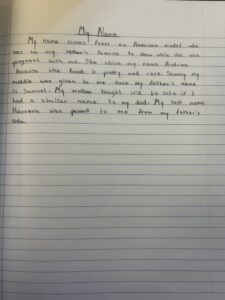
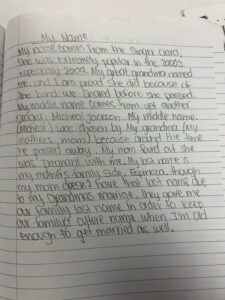
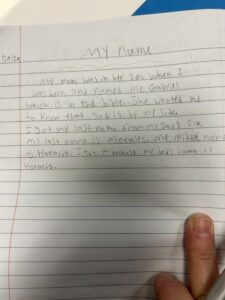
As students experience adolescence, they are exploring their own identities and whether they want to “fit in.” These texts are rich with language, culture, and these themes so much so that they resonate with students. In my classes, I have high numbers of reclassified ELD students, many of whom are Latinx, so these texts are ideal for helping my students see themselves in Esperanza, Julia, and Xiomara.
Once we have deconstructed these texts, I have my students write about the origin of their own names (see pics). Many of them have rich stories about the history of their first, middle, and/or last names. They take pride in sharing these stories, and I believe their journal entries are rich with family histories and language that I often do not see in more academic writing that is mandated by our district. Instead, I see students identify with the authenticity of the aforementioned authors, and I see them own their names, their family histories (which, at times, are generational), and their cultures. Just as important, I see student engagement increase, I see excitement for learning, and I see young people who are beginning to see themselves as “writers” maybe for the first time in their lives.
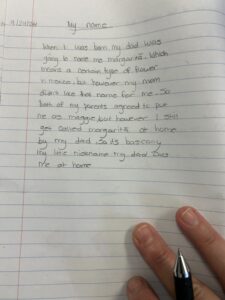
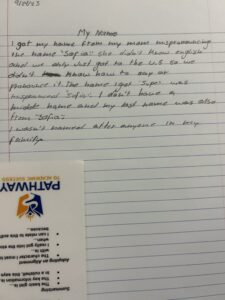
Our next steps are for students to expand upon this writing by creating presentations in Canva or PowerPoint, where they will include more characteristics of their identity—foods, language, music, attire, and events in their lives that have helped shape them into the beautiful humans they are today. I cannot wait to see what they produce!
 Carrie the “Real” Deahl is a writer, storyteller, and high school English and creative writing teacher in Phoenix, Arizona. Deahl has been published in the Arizona English Teacher Association’s English Bulletin, NCTE’s English Journal, and Grand Canyon University’s literary magazine, Shadows. Occasionally, you will find Deahl onstage performing spoken word and storytelling. Deahl currently resides in Phoenix, Arizona, with a cute, white bundle of joy named Huckleberry and a sassy cat named Rilke.
Carrie the “Real” Deahl is a writer, storyteller, and high school English and creative writing teacher in Phoenix, Arizona. Deahl has been published in the Arizona English Teacher Association’s English Bulletin, NCTE’s English Journal, and Grand Canyon University’s literary magazine, Shadows. Occasionally, you will find Deahl onstage performing spoken word and storytelling. Deahl currently resides in Phoenix, Arizona, with a cute, white bundle of joy named Huckleberry and a sassy cat named Rilke.
You can follow them on Instagram @realdeal3.
It is the policy of NCTE in all publications, including the Literacy & NCTE blog, to provide a forum for the open discussion of ideas concerning the content and the teaching of English and the language arts. Publicity accorded to any particular point of view does not imply endorsement by the Executive Committee, the Board of Directors, the staff, or the membership at large, except in announcements of policy, where such endorsement is clearly specified.

